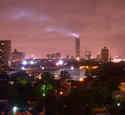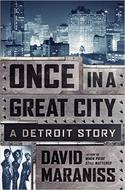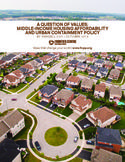The major metropolitan area journey to work data is out, reported in the American Community Survey ‘s 2014 one year edition. The news is that there is not much news. Little has changed since 2010 despite all the talk about “peak car” and a supposed massive shift towards transit. Single occupant driving remains by far the largest mode of transport to work in the 53 major metropolitan areas (with over 1,000,000 population), having moved from 73.5 percent of commutes to 73.6 percent. read more »
Urban Issues
2014 Journey to Work Data: More of the Same
- Login to post comments
The Cities Where Your Salary Will Stretch The Furthest 2015
Average pay varies widely among U.S. cities, but those chasing work opportunities would do well to keep an eye on costs as well. Salaries may be higher on the East and West coasts, but for the most part, equally high prices there mean that the fatter paychecks aren’t necessarily getting the locals ahead. read more »
- Login to post comments
When Detroit Stood Tall and Shaped the World
My recent post about how urban planning decisions helped lead to the Motown sound in Detroit was inspired by David Maraniss’ new book Once in a Great City: A Detroit Story.
The book takes a deep dive into Detroit 1963, a city that was, although in some ways already in decline, in others near its zenith.
It’s a great read, in particularly for the depth of characterization. Too often Detroit writing is a story of heroes, villains, and victims. Maraniss rejects that approach and provides mostly nuanced portrayals of Detroiters that allows them to be the actual real, red-blooded human beings that they are. read more »
- Login to post comments
Too Many Places Will Have too Few People
The adage “demographics are destiny” is increasingly being replaced by a notion that population trends should actually shape policy. As the power of projection grows, governments around the world find themselves looking to find ways to counteract elaborate and potentially threatening population models before they become reality. read more »
How Land Use Regulations Hurt the Poor
Sandy Ikeda and I have published a new Mercatus paper on the regressive effects of land use regulation. We review the empirical literature on how the effects of rules such as maximum density, parking requirements, urban growth boundaries, and historic preservation affect housing prices. Nearly all of the studies on the price effects of land use regulations find that — as supply and demand analysis would predict — these rules increase the price of housing. read more »
- Login to post comments
Public Transport’s Biggest Problem: The Public (That’s Us)
When’s the last time you heard some futurist or management guru suggest that in the future more of us will be working at the same desk doing routine tasks on a predictable working week schedule? No? That’s just one of many problems that advocates of limitless spending on public transport need to keep in mind in dealing with the issue of urban congestion. read more »
- Login to post comments
A Question of Values: Middle-Income Housing Affordability
This is the Executive Summary from a new report “A Question of Values: Middle-Income Housing Affordability and Urban Containment Policy" authored by Wendell Cox and published by the Frontier Centre for Public Policy. Ailin He, a PhD doctoral candidate in economics at McGill University served as research assistant. read more »
- Login to post comments
Collingswood: The Main Street Model
There’s a weird war raging these days. There are people who advocate high rise living and public transit in the urban core to the exclusion of other arrangements. And then there are folks who can’t hold their head up high in church on Sunday if they don’t live on a quarter acre lot out on the far fringe of the metroplex with four cars parked in front of their fully detached home. I always choose the thing in the middle. It’s called a “town”. I’m a Main Street kind of guy. read more »
- Login to post comments
How Chicago’s 606 Trail Fell Short of Expectations
When I was back in Chicago over Labor Day, I had to check out the “big three” new public space projects there: the Riverwalk, Maggie Daley Park, and the 606 Trail. The Riverwalk is a spectacular project I already wrote about. Maggie Daley Park, a new playground just across Columbus Dr. from Millennium Park’s Frank Gehry designed band shell, has been controversial and got mixed reviews. But I really liked it. More importantly, kids seem to love it. read more »
- Login to post comments
So Much For The Death Of Sprawl: America's Exurbs Are Booming
It’s time to put an end to the urban legend of the impending death of America’s suburbs. With the aging of the millennial generation, and growing interest from minorities and immigrants, these communities are getting a fresh infusion of residents looking for child-friendly, affordable, lower-density living. read more »






















